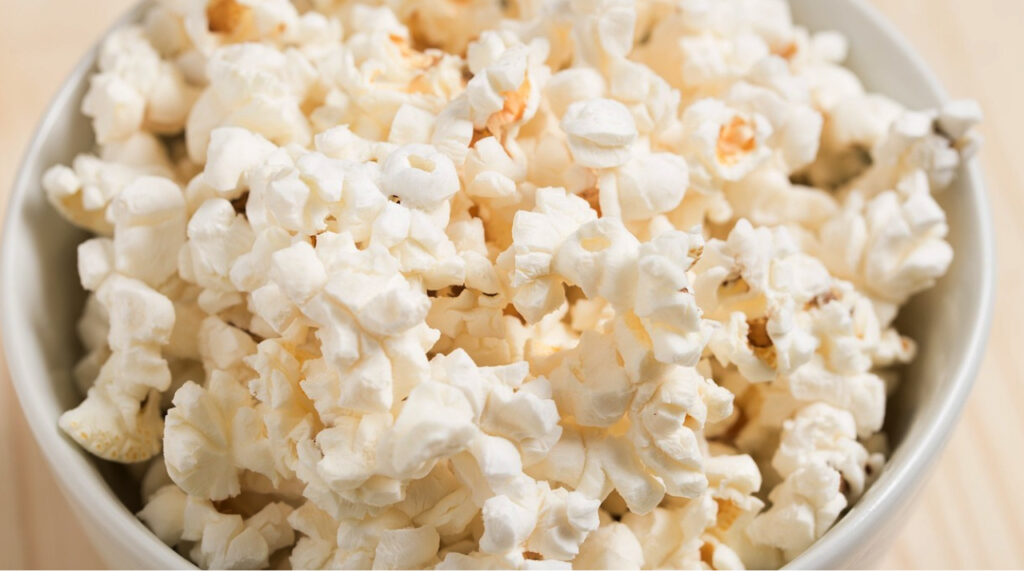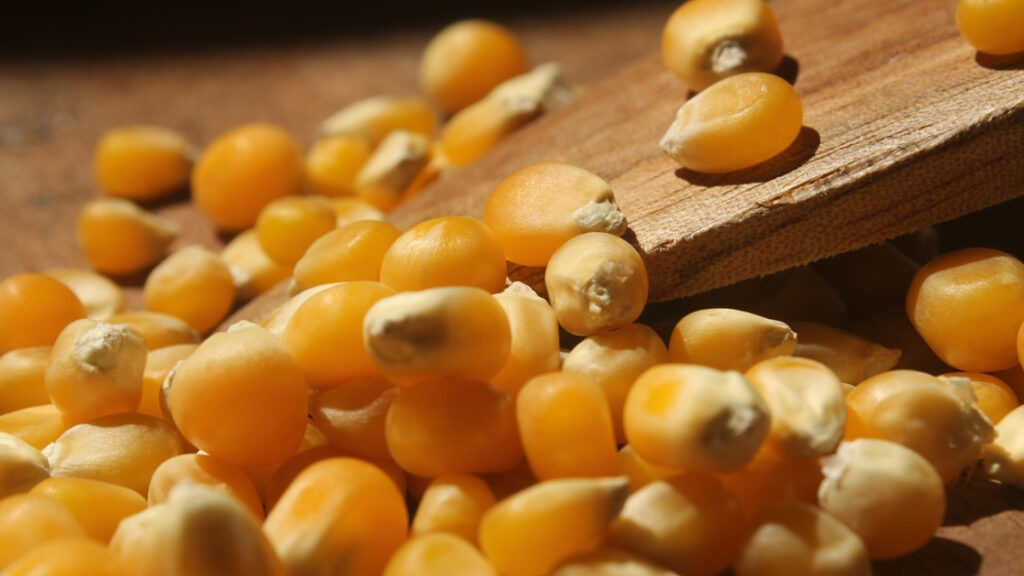
Popcorn is a type of corn kernel that puffs up and expands when heated. It is typically made by heating the corn kernels until the moisture inside turns into steam, causing the kernels to burst open. The result is a light, fluffy snack that is often enjoyed with various seasonings, such as salt or butter.
But can rats eat popcorn too?
Yes, rats can eat plain, air-popped popcorn in moderation. It’s essential to avoid giving them popcorn with added salt, butter, or other seasonings, as these can be harmful to their health. Additionally, unpopped kernels should be removed to prevent choking.
So, should you feed popcorn to your rats?
Let’s find out!
Table of Contents
Can Rats Eat Popcorn?
Yes, rats can eat popcorn but it’s important to provide it to them in moderation and with certain considerations.
If you want to give popcorn to your rats, make sure it’s plain and air-popped.
Avoid adding any seasonings, butter, salt, or other flavorings, as these can be harmful to rats.
Commercial microwave popcorn often contains added ingredients like butter flavorings and salt, which are not suitable for rats.
So, stick to plain, air-popped popcorn.
Also, break the popcorn into small, manageable pieces. This helps prevent choking and makes it easier for rats to eat.
Lastly, popcorn should only be given as an occasional treat and not as a primary food source. Rats have specific nutritional needs, and a balanced diet is crucial for their health. Too much popcorn can lead to an imbalance in their diet.
Also read: Can Rats Eat Bread?
How Much Popcorn Can Rats Eat?
When it comes to feeding popcorn to rats, moderation is key.
While popcorn can be given as an occasional treat, it should not make up a significant portion of their diet.
The amount of popcorn you give to your rats depends on their size, age, and overall health.
As a general rule, a small piece or a few pieces of popcorn per rat is sufficient.
Break the popcorn into small, bite-sized pieces. This helps prevent choking and makes it easier for the rats to handle and consume.
Lastly,pay attention to how your rats react to popcorn and other treats. If you notice any digestive issues, allergies, or changes in behavior, it’s essential to adjust their diet accordingly and consult with a veterinarian if needed.
Is Popcorn Healthy for Rats?
While popcorn can be considered a safe and enjoyable treat for rats when given in moderation, it’s important to note that it doesn’t offer significant health benefits for them.
Popcorn primarily serves as a tasty and crunchy treat rather than a nutritionally dense food source for rats.
A typical serving of popcorn (1 cup) contains:
- Calories: Approximately 31 calories
- Protein: 1.2 grams
- Fat: 0.4 grams
- Carbohydrates: 6.2 grams
- Fiber: 1.2 grams
Other health benefits of popcorn may include:
Enrichment and Mental Stimulation
Popcorn can provide enrichment for rats by offering a different texture and flavor. Chewing on popcorn can also help fulfill their natural instinct to gnaw and keep their teeth healthy.
Variety in Diet
Offering a variety of treats, including popcorn, can add variety to the rats’ diet, making mealtime more interesting for them.
Risks of Overfeeding Popcorn to Rats

While popcorn can be a safe and enjoyable treat for rats when given in moderation, there are risks associated with overfeeding or making it a significant part of their diet.
Here are some risks of overfeeding popcorn to rats:
Obesity
Popcorn, especially if it’s popped with oils or butter, can be calorie-dense. Overfeeding can contribute to weight gain and obesity in rats.
Obesity in rats can lead to various health problems, including cardiovascular issues and a shortened lifespan.
Digestive Issues
Rats have sensitive digestive systems, and a sudden introduction of a large amount of popcorn can lead to digestive upset.
This may manifest as diarrhea, stomach discomfort, or other gastrointestinal issues.
Choking Hazard
Rats can potentially choke on large pieces of food, including popcorn.
Offering popcorn in small, manageable pieces can help reduce the risk of choking.
Dental Problems
While rats need to gnaw on things to keep their teeth healthy, overconsumption of hard and crunchy foods like popcorn can contribute to dental problems, such as overgrown teeth or dental malocclusions.
Thus, treat like popcorn should be given occasionally.
The majority of their nutrition should come from a well-balanced rat food formulated to meet their specific dietary requirements.
Can Rats Eat Popcorn Kernels
Feeding rats popcorn kernels is not recommended.
While plain, popped popcorn can be offered to rats in moderation as a treat, unpopped kernels pose a potential hazard and should be avoided for various reasons.

Firstly,popcorn kernels are hard and can present a choking hazard for rats.
Rats may attempt to eat them, and if the kernels get lodged in their throat, it could lead to choking.
Rats have relatively small digestive systems, and hard substances like unpopped popcorn kernels may be difficult for them to digest.
Consuming such hard objects could potentially cause gastrointestinal problems.
Lastly,rats’ teeth continuously grow, and they need to chew on a variety of items to keep their teeth at a healthy length. While rats can chew on softer treats like popped popcorn, unpopped kernels may be too hard and could potentially cause dental issues.
Thus, you shouldn’t let your little friend eat popcorn kernels
What About Flavored Popcorns?
Similarly, feeding flavored popcorns to your rats are not recommended as well.
While rats can technically eat plain, air-popped popcorn in moderation, flavored popcorns often contain additional ingredients that may not be suitable for their health.
For example, flavored popcorns often contain salt, artificial flavorings, and seasonings. Rats have sensitive dietary requirements, and excess salt can be harmful to them.
Additionally, artificial flavorings and seasonings may not be suitable for their digestive system.
So, if you want to offer popcorn as a treat to your rats, it’s best to stick with plain, air-popped popcorn without any additional toppings or flavorings.
Alternative Treat Options for Your Rats
Providing a variety of treats for your rats can add enrichment to their diet while ensuring they receive the necessary nutrients.
Here are some alternative treat options for your rats:
- Fresh Fruits and Vegetables: Offer small, bite-sized pieces of fresh fruits and vegetables as treats. Rats enjoy a variety of produce, such as apples, carrots, broccoli, peas, and bananas. These foods are not only tasty but also provide essential vitamins and minerals.
- Nuts and Seeds: Rats can enjoy small amounts of unsalted nuts and seeds. Good options include almonds, sunflower seeds, and pumpkin seeds. Nuts are high in fat, so offer them sparingly to prevent obesity.
- Whole Grains: Offer small amounts of cooked whole grains like brown rice, quinoa, and oats. These foods provide carbohydrates and fiber.
- Yogurt Drops: Plain, unsweetened yogurt drops can be a tasty and relatively healthy treat for rats. However, these should be given in moderation due to the sugar content in yogurt.
- Hard Dog Biscuits: Hard, crunchy treats designed for rodents or dogs can help keep your rats’ teeth in good condition. Ensure these treats are appropriate for rats and free from harmful additives.
- Cooked Pasta or Rice: Rats can enjoy small portions of cooked pasta or rice as a treat. Make sure it’s plain and free from sauces or seasonings.
- Cheese: Offer small amounts of plain, unsalted cheese. Cheese is high in fat, so moderation is key.
Always introduce new treats gradually and in small amounts to monitor your rats for any adverse reactions.
Additionally, ensure that treats do not make up more than 10% of their total diet.
Final Thoughts
To sum up, rats can indeed eat popcorn, but there are important considerations to keep in mind to ensure their safety and healthy.
Popcorn can be offered as an occasional treat in small, plain, and air-popped pieces. It provides enrichment and variety to their diet, contributing to mental stimulation and fulfilling their natural chewing instincts.
Happy feeding!
Before you go, here are other helpful articles:
